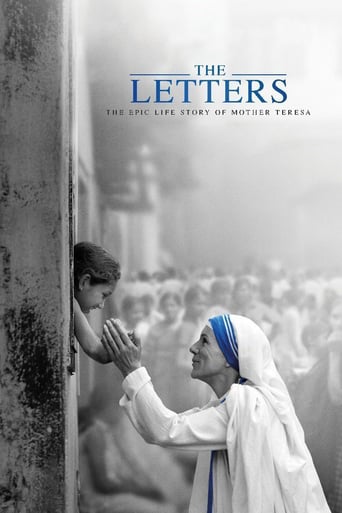Desertman84
The Letters is a biographical film about Saint Mother Teresa of Calcutta based on the letters of 50-year correspondence with her longtime friend and spiritual adviser,Father Celeste van Exem. It stars Juliet Stevenson as Mother Theresa together with Max von Sydow, Rutger Hauer and Priya Darshini.The story starts when Mother Teresa is honored to be a recipient of the Nobel Peace Prize for being one of the greatest humanitarians of our time.Millions are touched due to her selfless commitment that have changed their hearts and inspired them to be the extension of Christ's work particularly charity and helping the poor.Then a story is told from the point-of-view of Fr.Celeste who recounts her life from her work,how she started her own charity cause,the political oppression she experience in aiding the poor and her love for Christ.We could have been treated to a good film if there was more research done on Mother Teresa.Too bad that we just have the same information that is probably already known by many people around the world.Added to that,there is not much depth in too the characters as well.In the end,it simply became a watchable fare about the saint.
tavm
This is the second movie about Mother Teresa I've seen in my lifetime, the first being Mother Teresa: In the Name of God's Poor starring Geraldine Chaplin from several years back. This one goes through similar territory concerning her career of helping the poor but also explores her letters that gets discovered by some present-day cardinals. In those letters, she mentions how lonely and depressed she felt during all those years of doing what she always said was God's work though she never expressed that publicly and in fact, wanted those letters destroyed after she passed on not wanting the burden of being thought of as less-than-thankful for her life's work. My mom watched this with me and we both agreed it was another well-made film about a woman who sacrificed so much during her lifetime. So that's a high recommendation of The Letters.
marna-46624
The Letters was a beautiful film about a very pious and humble servant of God who dedicated her life to the poorest of the poor, the starving, sick and dying in the slums of Calcutta. Research done By Juliette Stevenson was obvious in that her portrayal of Mother Teresa was flawless, she became Mother Teresa down to the most minute detail. Her hands stood out to me in how she so lovingly and kindly touched the sick and dying. Oscar contender for sure. This film is a much needed reprieve from all the horror, violence, and ludicrous reality shows and senseless killings, in the name of religion no less, that is so prevalent today. A Nobel Peace recipient we all know she was, but The Letters will tell you so much more about this woman who suffered within, but never stopped giving of herself because in her eyes everyone was a child of God.
David Ferguson
Greetings again from the darkness. All we need is one more miracle. Having been beatified with one "confirmed" miracle, it's that missing second one that stands between Mother Teresa and Sainthood. At times the film from director William Rilead plays like a highlight reel for Mother Teresa's induction into the Catholic Hall of Fame, as the dual emphasis is on all the good things she did for the poor, as well as the surprising sense of isolation and abandonment she felt most of her life.The film is structured in flashback form as a priest played by Rutger Hauer is charged with researching the case for canonizing the late Mother Teresa. He crosses paths with Father Celeste van Exem (Max von Sydow), who shares the saved correspondence from Mother Teresa that provides the title of the movie. These very personal letters spanned 50 years and act much as a journal of her work and emotions.Most of the movie takes us through the progression of Mother Teresa's life. A slump-shouldered Juliet Stevenson portrays the nun as a woman on a mission from God … despite the obstacles from her detractors: jealous and disapproving nuns, many in the Catholic Church, and even some of the local citizens whom she desired to help. Her commitment to assist "the poorest of the poor" placed her in some tough situations and undesirable environments. She seemed to take on the suffering of those she was serving.Given her proclamation that "It's God's will, not mine", the Vatican approved her plan to go outside the Loreto Order to serve the poor. Two years later, her application for a new order was approved, resulting in the congregation of The Missionaries of Charity. Her mission then had structure and backing, and so began to make real progress.Capturing the essence of this woman is what the film does best. We absolutely understand how she became "an icon of compassion for all religions" by giving "voice to the poor". Perhaps, given the times we are in, this ability to serve multiple religions could itself by considered a miracle. As with any person who serves others, Mother Teresa had (and has) her detractors and critics. She (like her Catholic Church) opposed contraception … despite the needs within the community she served. Others accused her of mismanaging the millions in contributions, and spending too much effort recruiting new Catholics. Again, those accusations are not the purpose of the film, which instead profiles a woman who helped so many who otherwise would have been ignored in their misery.As a Nobel Peace Prize winner in 1979, her commitment to the cause resulted in her most public recognition and brought her full circle from an early line of dialogue: "I may not be wanted here, but I am needed." Regardless of the Catholic rule book requirements, it's difficult to imagine a modern day person more worthy of being considered a Saint.

